
The Order of Orange-Nassau is a civil and military Dutch order of chivalry founded on 4 April 1892 by the queen regent, Emma of the Netherlands.

The Order of the Red Banner of Labour was an order of the Soviet Union established to honour great deeds and services to the Soviet state and society in the fields of production, science, culture, literature, the arts, education, sports, health, social and other spheres of labour activities. It is the labour counterpart of the military Order of the Red Banner. A few institutions and factories, being the pride of Soviet Union, also received the order. The Order of the Red Banner of Labour was the third-highest civil award in the Soviet Union, after the Order of Lenin and the Order of the October Revolution.

People's Artist of the USSR, also sometimes translated as National Artist of the USSR, was an honorary title granted to artists of the Soviet Union. The term is confusingly used to translate two Russian language titles: Народный артист СССР, awarded in performing arts and Народный художник СССР, granted in some visual arts.
This article describes the religious, military and civil orders, decorations and medals of the Union of Myanmar.
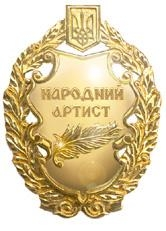
People's Artist of Ukraine is an honorary title awarded by the government of Ukraine. It is the highest title awarded to outstanding performing artists whose merits are exceptional in the sphere of the development of the performing arts, including theatre, music, dance, circus, and cinema. For visual arts, there is a separate title.
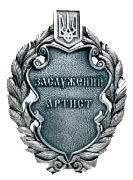
Honored Artist of Ukraine is a state honorary title of decoration of the Ukrainian government. Originally awarded by the Ukrainian SSR, the award continued after Ukraine regained independence, recognizing outstanding achievement in the performing arts. The Law of Ukraine regulates it Regarding the State Awards of Ukraine (#1549-14).

Orders, decorations and medals of Albania are state decorations regulated and bestowed by the Republic of Albania.

Merited Artist of Albania was a state honorary title for the decoration of outstanding art performers of People's Socialist Republic of Albania. It was created by law in 1960 and amended in 1980. The title was no longer given in Albania after the law was amended in 1996.

The Hero of the People was the highest title bestowed upon the citizens of the People's Socialist Republic of Albania, one of several Hero titles awarded by Eastern Bloc countries.

Melpomeni Mihal Çubonja was an Albanian actress and an honored People's Artist of Albania. She has starred in films such as Tana (1958), Estrada në ekran (1968) and Kapedani (1972).

The Medal "For Distinguished Labour" was a civilian labour award of the Soviet Union bestowed to especially deserving workers to recognise and honour high performances in labour or contributions in the fields of science, culture or the manufacturing industry. In just over fifty years of existence, it was bestowed to over two million deserving citizens. It was established on 27 December 1938 by decree of the Presidium of the Supreme Soviet of the USSR. Its statute was amended three times by further decrees, firstly on 19 June 1943 to amend its description and ribbon, then on 16 December 1947 to amend its regulations, and finally on 18 July 1980 to confirm all previous amendments. The medal ceased to be awarded following the December 1991 dissolution of the Soviet Union.

The Russian Federation Presidential Certificate of Honour is an honorary award bestowed by the President of the Russian Federation to deserving citizens. It was established by Presidential Decree No.487 of 11 April 2008. The statute and regulations governing this award were amended on two occasions, first on 12 January 2010 by Presidential Decree No.59 and again on 14 January 2011 by Presidential Decree No. 38.

The National Order of Merit is a state order of the Republic of Malta. The order is divided into four grades that may be awarded to Maltese citizens.

The "Honor of the Nation" Decoration is the highest decoration to be given in Albania, among the Civil awards and decorations of Albania, and was instituted by special law No. 8113, of 28 March 1996, entitled Për dekoratat në Republikën e Shqipërisë, later amended by law No. 112/2013 Për dekoratat, titujt e nderit, medaljet dhe titujt vendorë të nderit në Republikën e Shqipërisë.

Lola GjokaAleksi was an Albanian pianist during the period of the Communist regime.

The National Flag Decoration is one of the highest decorations to be given in Albania, among the Civil awards and decorations of Albania, and was instituted by special law Nr.8113, of 28 March 1996.
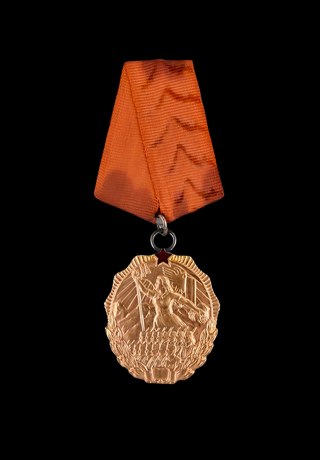
The Order of the Flag was an honorary award given to citizens, collectives, factories, administrative divisions, institutions and organizations in the People's Socialist Republic of Albania.

The Mother Heroine title was an honorary title given to mothers in the People's Socialist Republic of Albania.
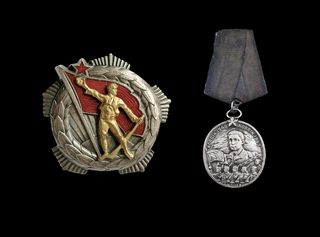
The Medal of Remembrance was an honorary award given to the people and army formations in the People's Socialist Republic of Albania.
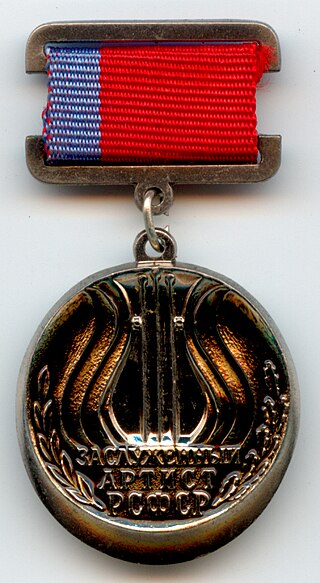
Honored Artist of the RSFSR was an honorary title granted to Soviet artists, including theatre and film directors, choreographers, music performers, and orchestra conductors, who had outstanding achievements in the arts, and who lived in the Russian Soviet Federative Socialist Republic (RSFSR) from 1931 to 1991.


















